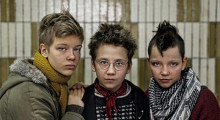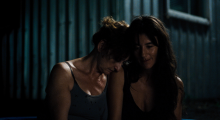Authors — Steven Erickson
-
Rodney Evans on Documenting His Own, and Others’, Loss of Sight in Vision Portraits

Rodney Evans’ Vision Portraits works his experience of gradually losing his eyesight while continuing to make films into a personal documentary that also considers the larger implications of this experience for artists and minorities. The film is structured around Evans’ own experience: he shows himself on film sets, dealing with the aftermath of falling onto an Amtrak train platform in New Jersey and traveling to Berlin to get surgery. But in between, he also profiles three artists who are largely or entirely blind: photographer John Dugdale, dancer Kayla Hamilton and writer Ryan Knighton. Dugdale makes the biggest impression; despite losing […]
by Steven Erickson on Aug 6, 2019 -
“The Movie Industry’s Great Triumph”: J. Hoberman on Make My Day, Ronald Reagan and Donald Trump

The narrative in which New Hollywood was wiped out by Jaws, Star Wars and the rise of the blockbuster that followed, paralleling the elections of Reagan and Thatcher in a retreat from the rebellions of the ‘60s and ‘70s, is a very familiar one. J. Hoberman has written a trilogy of books exploring the interwoven histories of the US and its cinema: The Dream Life: Movies, Media and the Mythology of the Sixties, Army of Phantoms: American Movies and the Making of the Cold War and now Make My Day: Movie Culture in the Age of Reagan. Drawing on his […]
by Steven Erickson on Jul 24, 2019 -
“A Freudian Tale of the Boy, the Adult and the Old Man”: Stevan Riley on Listen to Me Marlon

Since his death, Marlon Brando has become a legend, but the actor and the man himself have gotten lost. British director Stevan Riley’s documentary Listen to Me, Marlon attempts to restore the person underneath the myth. To some extent, that’s an impossible task; even Brando himself, heard on self-recorded audio tape, talks about how movie audiences project themselves into actors. Drawing on hundreds of hours of tape recorded by Brando, as well as other audio and video sources, Riley assembles the autobiography the actor never gotten around to writing. Instead of interviewing other actors and directors about the Method, Elia […]
by Steven Erickson on Jul 29, 2015 -
“I Was Too Young For Punk”: Lukas Moodysson on We Are the Best!

Back in 1998, Swedish director Lukas Moodysson’s debut Show Me Love (original title: Fucking Åmål) offered up a tender story of teenage lesbian love. His follow-up Together, which depicted a troubled commune in the late ‘70s, continued in much the same vein, but starting with his third film, Lilya 4-Ever, his work grew darker and more experimental. The change in tone really didn’t suit him. Fortunately, his latest film, We Are the Best!, is a return to form. It follows three 13-year-old girls in 1982 Stockholm as they form a punk band and try to master one song (a protest […]
by Steven Erickson on May 28, 2014 -
Interview with Vic + Flo Saw a Bear Director Denis Côté

Quebecois filmmaker Denis Côté makes an unassuming, unabashedly regional kind of cinema, drawing on the rhythms and landscapes of his native province. It’s taken him a long time to get attention south of the border – I had to travel to the Toronto Film Festival to see his first film, Drifting States. He seemed to have a breakthrough of sorts in the U.S. with Curling, which at least got some attention on the festival circuit and was acquired by New Yorker Films, who never released it. Bestiaire, a semi-documentary shot in a Montreal zoo, got him more attention, and Vic […]
by Steven Erickson on Feb 4, 2014 -
Director Cate Shortland on Lore

In telling the story of Lore (Saskia Rosendahl), a 14-year-old daughter of Nazi parents who travels across a devastated Germany in 1945, Cate Shortland’s Lore, adapted from Rachel Seiffert’s novel The Dark Room, plays with fire. As the director acknowledges, it could easily be misread as a statement that (Gentile) Germans were also victims of World War II. Instead, the film suggests what it’s like to fall from great privilege. Without fully understanding what it means to be a Nazi and what responsibility for evil her parents hold, Lore goes from being rich and well cared for to being treated […]
by Steven Erickson on Feb 5, 2013 -
Ra’anan Alexandrowicz on The Law in These Parts

Ra’anan Alexandrowicz’s The Law in These Parts sheds new light on the Israeli-Palestinian conflict from an unexpected perspective. Interviewing nine military judges, the director explores how Israel created a new legal system to control the Gaza Strip and West Bank after occupying them in 1967. At first, the state may have begun with the understandable desire to defend itself from violence, but its justifications quickly became self-serving. In one of the film’s most memorable examples, a woman was sentenced to a year and a half in jail for giving a “terrorist” bread. The film consists of stylized interviews with the […]
by Steven Erickson on Nov 15, 2012
